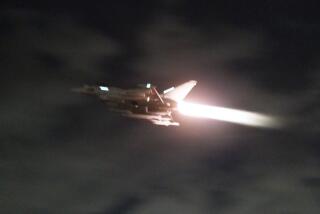Bluster Over the Gulf
- Share via
President Reagan suggested this week that shore-based missile launchers in Iran would be fair game for retaliation if they fired at American flagships in the Persian Gulf, and at the same time said that there is no danger of war.
Such bluster seems to be as close as the Administration has gotten to formulating a policy to guide its next moves in the volatile gulf, even as it proceeds with plans to let Kuwaiti oil tankers plying the gulf fly American flags and assign one or more of the six U.S. Navy vessels to escort them. So far, Iran has fired on 25 Kuwaiti ships.
Logic is on the President’s side on the question of war, with Iran already spread thin in its campaign to topple the government of Iraq. But that is American logic, and it does not necessarily apply to a nation that feeds its young to artillery barrages in the name of its own brand of Islam.
Even short of war, the crippling of the frigate Stark and the death of 37 of its crew raise serious questions both about the wisdom of using high-technology ships in the close quarters of the gulf and providing escorts without adequate air cover. The nearest U.S. aircraft carrier is in the Indian Ocean, a two-day run from the gulf. Even if it were on station at the Straits of Hormuz, that is as close as it could get, the gulf being too cramped for carriers. Yet any American flagship cruising in the gulf must run a gauntlet of missiles based in Iran that fly at nearly supersonic speeds.
Reagan stressed this week that the gulf is an international waterway that should not be susceptible to closing by “barbaric” Iranians, particularly when the world’s industrial nations depend so heavily on the region for oil. That point is well-taken. It also raises the fundamental question of why the United States must go it nearly alone to protect international waters and whether patroling the gulf is not an international job. Europe and Japan depend far more on oil from the gulf than does the United States, which gets five barrels of oil from other sources for every one barrel it imports from Saudi Arabia.
The White House denied reports Thursday that Reagan was putting the Kuwait operation on hold for a few weeks. But that is exactly what he should do until there is a clear policy, a careful plan of action and an acknowledgment from other nations that keeping international waters open to trade is an international task.
More to Read
Sign up for Essential California
The most important California stories and recommendations in your inbox every morning.
You may occasionally receive promotional content from the Los Angeles Times.












